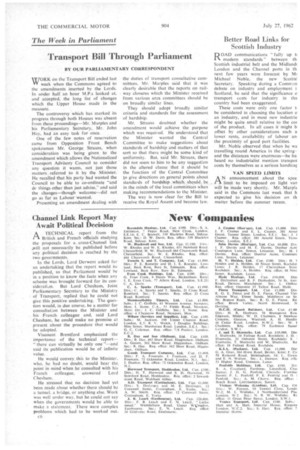Transport Bill Through Parliament
Page 46

If you've noticed an error in this article please click here to report it so we can fix it.
11‘' OUR PARLIAMENTARY CORRESPONDENT WORK an the Transport Bill ended last VI' week when the Commons agreed to thc amendments inserted by the Lords. In under half an hour M.P.s looked at, and accepted, the long list of changes which the Upper House made in the measure.
The controversy which has marked its progress through both Houses was absent from these proceedings—Mr. Marples and his Parliamentary Secretary, Mr. John Hay, had an easy task. for once.
One of the few notes of reservation came from Opposition Front Bench spokesman Mr. George Strauss, when consideration was being given to the amendment which allows the Nationalized Transport Advisory Council to consider any question it wants, not just those matters referred to it by the Minister. He recalled that his party had wanted the Council to be able to co-ordinate "and de things other than just advise," and said the changes—though welcome—did not go as far as Labour wanted.
Presenting an amendment dealing with the duties of transport consultative committees. Mr. Marples said that it was clearly desirable that the reports on railway closures which the Minister received from various area committees should be on broadly similar lines.
They should adopt broadly similar criteria and standards for the assessment of hardship.
Mr. Strauss doubted whether the amendment would achieve the purpose which was required. He understood that the Minister wanted the Central Committee to make suggestions about standards of hardship and matters of that sort so that there might be some kind of uniformity. But, said Mr. Strauss, there did not seem to him to be any suggestion in the altered clause that it should be the function of the Central Committee to give directions on general points about standards of hardship which, should, be in the minds of the local committees when making recommendations to the Minister.
The way is now clear for the Bill to receive the Royal Assent and become law.
































































































































